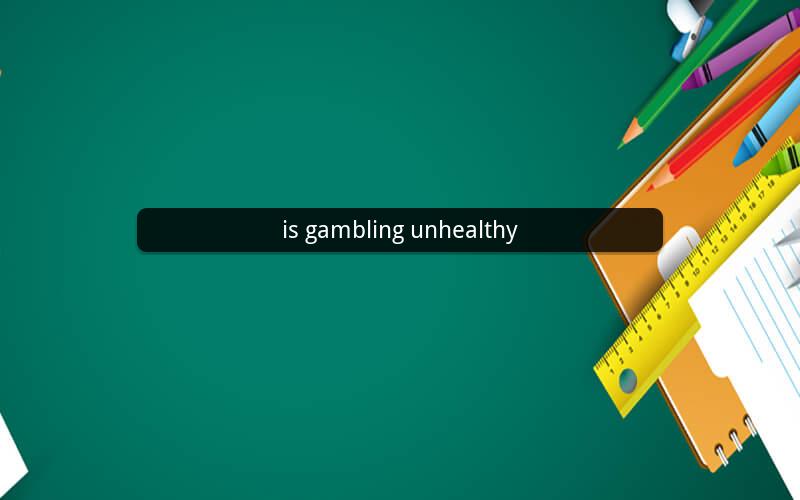
Contents
1. Introduction to Gambling
2. Health Risks Associated with Gambling
3. Psychological Health Impacts
4. Physical Health Risks
5. Social and Financial Consequences
6. Prevention and Treatment
7. Conclusion
Introduction to Gambling
Gambling has been a part of human culture for centuries. It involves risking something of value on an event with an uncertain outcome. While it can be a fun and entertaining activity, it also poses potential health risks. In this article, we will explore the question of whether gambling is unhealthy and discuss the various aspects of this issue.
Health Risks Associated with Gambling
Gambling can have a significant impact on an individual's health, both physically and mentally. The World Health Organization (WHO) recognizes gambling as an addictive behavior, which can lead to various health problems.
Psychological Health Impacts
One of the most significant risks of gambling is its impact on psychological health. Problem gambling can lead to a range of mental health issues, including:
- Depression: Individuals with gambling problems often experience feelings of sadness, hopelessness, and worthlessness.
- Anxiety: The fear of losing money and the pressure to win can lead to anxiety disorders.
- Addiction: Gambling can become an addictive behavior, similar to other substance addictions, leading to a range of negative consequences.
- Suicide: In some cases, individuals with gambling problems may attempt or commit suicide due to the overwhelming stress and despair.
Physical Health Risks
Gambling can also have a negative impact on physical health. Some of the physical health risks associated with gambling include:
- Heart Disease: The stress and anxiety caused by gambling can lead to high blood pressure, heart disease, and stroke.
- Sleep Disorders: Individuals with gambling problems often experience sleep disturbances, which can lead to chronic fatigue and other health issues.
- Weight Gain: Stress and emotional eating can lead to weight gain, which can increase the risk of various health problems, including diabetes and heart disease.
Social and Financial Consequences
Gambling can also have significant social and financial consequences. Some of the social and financial issues associated with gambling include:
- Family Strain: Problem gambling can lead to strained relationships with family members and friends.
- Financial Ruin: Individuals with gambling problems may go into debt, lose their homes, and even steal to fund their addiction.
- Work Performance: Problem gamblers may experience difficulties at work, such as decreased productivity, absences, and even job loss.
Prevention and Treatment
Preventing and treating gambling problems requires a multifaceted approach. Some of the strategies for prevention and treatment include:
- Education: Educating individuals about the risks of gambling can help prevent problem gambling.
- Counseling: Professional counseling can help individuals with gambling problems develop healthier coping mechanisms and address underlying issues.
- Support Groups: Support groups, such as Gamblers Anonymous, can provide individuals with a supportive community and resources for recovery.
Conclusion
Gambling can be an enjoyable activity, but it also poses significant health risks. The psychological, physical, social, and financial consequences of gambling can be devastating. By understanding the risks associated with gambling and taking steps to prevent and treat problem gambling, individuals can enjoy gambling responsibly and maintain their health and well-being.
Questions and Answers
1. Q: What are the psychological health impacts of gambling?
- A: The psychological health impacts of gambling include depression, anxiety, addiction, and even suicide in severe cases.
2. Q: Can gambling lead to physical health problems?
- A: Yes, gambling can lead to physical health problems such as heart disease, sleep disorders, and weight gain.
3. Q: What are the social consequences of gambling?
- A: The social consequences of gambling include strained relationships with family and friends, as well as potential job loss.
4. Q: Can gambling cause financial ruin?
- A: Yes, gambling can lead to financial ruin, as individuals may go into debt and even steal to fund their addiction.
5. Q: How can education help prevent problem gambling?
- A: Education can help individuals understand the risks associated with gambling, which can prevent problem gambling in some cases.
6. Q: What types of counseling are available for individuals with gambling problems?
- A: Counseling options for individuals with gambling problems include individual therapy, group therapy, and family therapy.
7. Q: Are there any support groups for individuals with gambling problems?
- A: Yes, support groups such as Gamblers Anonymous provide a supportive community and resources for recovery.
8. Q: Can technology help prevent problem gambling?
- A: Yes, technology can help prevent problem gambling by providing tools for self-exclusion and monitoring gambling behavior.
9. Q: How can individuals seek help for gambling problems?
- A: Individuals can seek help for gambling problems by speaking with a healthcare provider, counselor, or contacting a support group.
10. Q: Can gambling lead to addiction?
- A: Yes, gambling can lead to addiction, similar to other substance addictions, and can have devastating consequences.